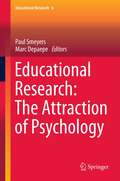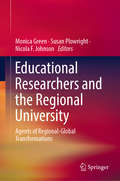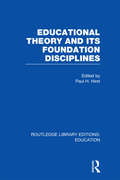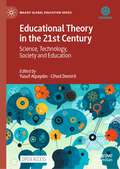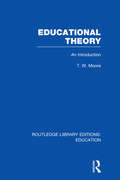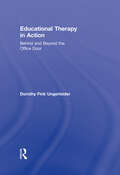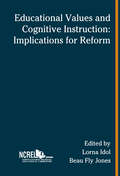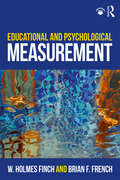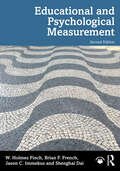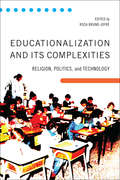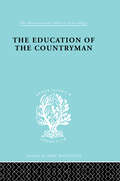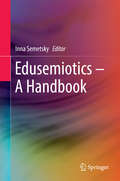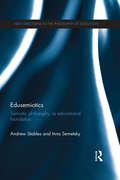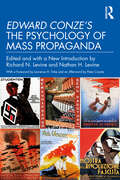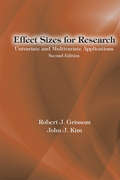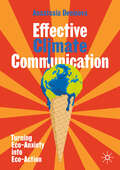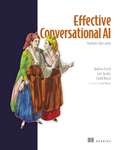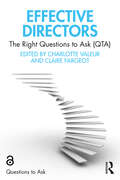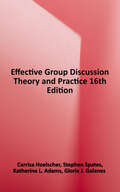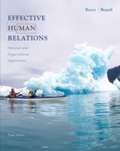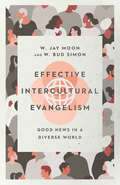- Table View
- List View
Educational Research: The Attraction of Psychology
by Paul Smeyers Marc DepaepeThe closely argued and provocative contributions to this volume challenge psychology's hegemony as an interpretive paradigm in a range of social contexts such as education and child development. They start from the core observation that modern psychology has successfully penetrated numerous domains of society in its quest to develop a properly scientific methodology for analyzing the human mind and behaviour. For example, educational psychology continues to hold a central position in the curricula of trainee teachers in the US, while the language of developmental psychology holds primal sway over our understanding of childrearing and the parent-child relationship. Questioning the default position of modern psychology as a way of conceptualizing human relations, this collection of papers reexamines key assumptions that include psychology's self-image as a 'scientific' discipline. Authors also argue that the dogma of neuropsychology in education has demoted concepts such as 'emotion', 'feeling' and 'relationship', so that they are now 'blind spots' in educational theory. Other chapters offer a cautionary analysis of how misshapen notions of psychology can legitimize eugenics (as in Nazi Germany) and poison racial attitudes. Above all, has psychology, with its focus on individual merit, been complicit in hiding the impacts of power and privilege in education? This bracing new volume adopts a broader definition of education and childrearing that admits the essential contribution of the humanities to the proper study of mankind. This publication, as well as the ones that are mentioned in the preliminary pages of this work, were realized by the Research Community (FWO Vlaanderen / Research Foundation Flanders, Belgium) Philosophy and History of the Discipline of Education: Faces and Spaces of Educational Research.
Educational Research: The Importance and Effects of Institutional Spaces
by Paul Smeyers Marc Depaepe Edwin KeinerThis collection of fresh analyses aims to map the links between educational theory and research, and the geographical and physical spaces in which teaching is practiced and discussed. The authors combine historical and philosophical perspectives in examining the differing institutional loci of education research, and also assess the potential and the limitations of each. The contributors trace the effects of 'space' on educational practice in the classroom, in the broader institutions, and in the academic discipline of education--doing so for a range of international contexts. The chapters address various topics relating to the physical and geographical environment. How, for example, does geographical space shape researchers' mental frameworks? How did the learning environments in which young children are taught today evolve? To what extent did parochialism shape America's higher education system? How can our understanding of classroom practice be enhanced by concepts of space? The book acknowledges that texts themselves, as well as the research 'arena', are 'spaces' too, and notes the fascinating debate on the concept of space in the field of mathematics education. Indeed, as more and more students move online, the book analyses the rising importance of virtual spaces such as Web 2.0, which have major educational implications for researchers and students joining the innovative 'virtual' universities of the future. This publication, as well as the ones that are mentioned in the preliminary pages of this work, were realized by the Research Community (FWO Vlaanderen / Research Foundation Flanders, Belgium) Philosophy and History of the Discipline of Education: Faces and Spaces of Educational Research.
Educational Researchers and the Regional University: Agents of Regional-Global Transformations
by Nicola F. Johnson Monica Green Susan PlowrightThis book showcases a compilation of research partnerships produced by the Federation University Gippsland School of Education. Through this book, readers will gain valuable insights into how education research initiatives can help adapt to an age characterized by massive regional/global economic, environmental, identity, cultural and social shifts. The respective chapters address the universal human and researcher condition in a regional setting, highlighting how individuals and groups are seeking to achieve transformation with their regional, educational research. On the whole, the compilation showcases a specific university in a regional context that is now responding to change by rejuvenating, reinventing, re-envisioning and rethinking its research, its identity and its relationality.
Educational Theory and Its Foundation Disciplines (Routledge Library Editions: Education)
by Paul H. HirstAt the time this book was first published the disciplines of philosophy of education, educational psychology, sociology of education and the history of education had developed rapidly. The papers in this volume outline the developments that took place. The first paper analyses the nature of a theory concerned with determining practice and the place of academic disciplines within that. What emerges is the crucial role of these disciplines, but also the need to develop much more adequately a domain of practical principles, assessed and critically reformulated in the light of those disciplines. The following papers are concerned with the contributions four of those disciplines are now making.
Educational Theory in the 21st Century: Science, Technology, Society and Education (Maarif Global Education Series)
by Yusuf Alpaydın Cihad DemirliThis open access book reviews the effects of the twenty-first century scientific-technological and social developments on the educational theory. The first part handles the subject, focusing on technology and educational philosophy. In the second part, the implications of new human and social conceptions towards the education paradigms are examined. In the chapters of the last part of the book, more practical dimensions of education are discussed. Transforming school designs, school management, learning-teaching approaches and teacher competencies are discussed in the context of broader social, cultural and technological changes.
Educational Theory: An Introduction (Routledge Library Editions: Education)
by Terence W MooreThis book comes strongly to the defence of educational theory and shows that it has a structure and integrity of its own. The author argues that the validity of educational theory may best be judged in terms of the various assumptions made in it. His argument is illustrated by a review and critique of some particularly influential theories of education: those of Plato, Rousseau, James Mill and John Dewey. He stresses the need for an on-going, contemporary, general theory of education and examines the ways in which the disciplines of psychology, sociology and philosophy can contribute to a general theory of this kind.
Educational Therapy in Action: Behind and Beyond the Office Door
by Dorothy Fink UngerleiderThis book provides an in-depth look at what a little-known clinician, the educational therapist, does and how they do it. It goes behind the clinician’s door to illustrate the unusual and broad range of interventions – both academic/vocational and social/emotional – that an educational therapist employs. This particular case study involves a young woman named Nora who had a severe but undiagnosed auditory processing disorder. She could not give meaning to the spoken language that came at her too rapidly, leaving her in a constant fog of words that she couldn’t comprehend. This case discloses the problems, their causes, and the emotional toll that had to be considered when developing an effective educational/therapeutic plan for Nora. It vividly illustrates the dynamic exchanges and mutual learning that goes on between client and therapist. Parts I and II illustrate how the psycho-educational interventions that addressed Nora’s academic and non-academic needs were gradually formulated over the first year. Part III provides a series of vignettes from subsequent years that illustrate the ongoing applications of the therapist’s work. Distinguishing Features Explanatory Sidebars – The rationale behind particular techniques and interventions is clarified through a system of explanatory sidebars that inform the reader without distracting from the story. This approach makes the book both an instructional tool well as compelling story. Organic Curriculum – The rationale for and application of an "organic (personalized) curriculum" is explained and applied throughout the book as a model for others to use in working with this population. A Longitudinal Perspective – The initial work with Nora began many years ago, so this book provides a long view of her life and tracks the influences that educational therapy exerted on her development into a fully functioning adult. Cognitive/Emotional Integration – The core of educational therapy – the interdependence of cognitive skills and emotional response – is clearly documented throughout the book. In addition to educational therapy students and practitioners, this book is appropriate for those working in related fields such as special education, school psychology, school counselling, and social work in educational settings.
Educational Values and Cognitive Instruction: Implications for Reform
by Beau Fly Jones Lorna IdolThis volume is a comprehensive guide to state-of-the-art research on thinking, cognitive instruction, social values, and reform. Cognitive instruction for at-risk students is discussed in great detail along with a thorough examination of the teaching of thinking skills from the viewpoint of educational values and school culture. The issues of thinking, learning, and cognitive instruction are linked to the educational reform movement from numerous perspectives. Specifically, the reader can better anticipate which aspects of research on thinking will conflict with existing paradigms and which aspects of schooling will be most resistant to change.
Educational and Psychological Measurement
by W. Holmes Finch Brian F. FrenchThis new text provides the most current coverage of measurement and psychometrics in a single volume. Authors W. Holmes Finch and Brian F. French first review the basics of psychometrics and measurement, before moving on to more complex topics such as equating and scaling, item response theory, standard setting, and computer adaptive testing. Also included are discussions of cutting-edge topics utilized by practitioners in the field, such as automated test development, game-based assessment, and automated test scoring. This book is ideal for use as a primary text for graduate-level psychometrics/measurement courses, as well as for researchers in need of a broad resource for understanding test theory.
Educational and Psychological Measurement
by W. Holmes Finch Brian F. French Jason C. Immekus Shenghai DaiThis new text provides the most current coverage of measurement and psychometrics in a single volume. Authors W. Holmes Finch, Brian F. French, Jason C. Immekus, and Shenghai Dai first review the basics of psychometrics and measurement, before moving on to more complex topics such as equating and scaling, item response theory, standard setting, and computer adaptive testing. Also included are discussions of cutting-edge topics utilized by practitioners in the field, such as automated test development, game-based assessment, and automated test scoring. This book is ideal for use as a primary text for graduate-level psychometrics/measurement courses, as well as for researchers in need of a broad resource for understanding test theory.Now in its second edition, Educational and Psychological Measurement features new material on:Ethical and fairness issues in testing, quality control in testing, alternative measurement models and scaling methods for psychological assessment, computerized assessment, and application of machine learning methods. It also contains pedagogical features such as “How it Works” and “Psychometrics in the Real World” boxes that break down important concepts through worked examples and show how theory can be applied to practice. End-of-chapter exercises allow students to test their comprehension of the material, while suggested readings and website links provide resources for further investigation A collection of free online resources includes the full output from R, SPSS, and Excel for each of the analyses conducted in the book, as well as additional exercises, sample homework assignments, answer keys, and PowerPoint lecture slides
Educationalization and Its Complexities: Religion, Politics, and Technology
by Rosa Bruno-JofréThis edited collection brings together scholars from Canadian and international institutions to discuss educationalization, a trend in modern societies that involves transferring social responsibilities onto the school system. This book brings a new dimension to the literature on educationalization by examining the concept in relation to Catholicism, Indigenous issues, the right to education, and historical studies grounded in both Canada and Chile. In these contributions, the book represents an attempt to both deepen the current discussion on the construction and use of educationalization as a concept as well as invite further exploration of this subject in relation to the increasing digitalization of life in the twenty-first century.
Eductn Of Countryman Ils 224 (International Library of Sociology)
by Harry McGuire BurtonFirst Published in 1998. Routledge is an imprint of Taylor & Francis, an informa company.
Edusemiotics – A Handbook
by Inna SemetskyEdusemiotics is a pioneering area of study that connects semiotics - the science of signs - with educational theory and the philosophy of education. This volume reflects cutting-edge research by scholars in education and in semiotics worldwide, bridging the two discourses to present the state of the art in this new transdisciplinary field. The book's emphasis is on educational theory as based on semiotic philosophy: as such, it challenges the current conception of semiotics in education as merely a sub-branch of applied semiotics. It presents edusemiotics as a novel unified conceptual framework at the interface of theoretical semiotics and educational philosophy, based on both theoretical and empirical studies from around the world. The chapters in this handbook also bring to the fore the intellectual legacy of Charles S. Peirce, John Dewey, Gilles Deleuze, Umberto Eco, Julia Kristeva, Mikhail Bakhtin, Paul Ricoeur, Martin Heidegger and other thinkers, pointing out the implications of edusemiotics for meaningful pedagogy and experiential learning in diverse contexts.
Edusemiotics: Semiotic philosophy as educational foundation (New Directions in the Philosophy of Education #64)
by Inna Semetsky Andrew StablesEdusemiotics addresses an emerging field of inquiry, educational semiotics, as a philosophy of and for education. Using "sign" as a unit of analysis, educational semiotics amalgamates philosophy, educational theory and semiotics. Edusemiotics draws on the intellectual legacy of such philosophers as John Dewey, Charles Sanders Peirce, Gilles Deleuze and others across Anglo-American and continental traditions. This volume investigates the specifics of semiotic knowledge structures and processes, exploring current dilemmas and debates regarding self-identity, learning, transformative and lifelong education, leadership and policy-making, and interrogating an important premise that still haunts contemporary educational philosophy: Cartesian dualism. In defiance of substance dualism and the fragmentation of knowledge that still inform education, the book offers a unifying paradigm for education as edusemiotics and emphasises ethical education in compliance with the semiotic unity between knowledge and action. Chapters contain accessible discussions in the context of educational philosophy and theory, crossing the borders between logic, art, and science together with a provocative theoretical critique. Recently awarded a PESA book award for its contribution to the philosophy of education, Edusemiotics will appeal to an academic readership in education, philosophy and cultural studies, while also being an inspiring resource for students.
Edward Conze's The Psychology of Mass Propaganda
by Richard N. Levine Nathan H. LevineEdward Conze’s The Psychology of Mass Propaganda presents a commentary on the psychology of propaganda during the rise of fascism in Europe in the 1930s. It discusses the conditions which generate vulnerability to misinformation in human societies, and thus offers insight into how propaganda may be "withstood." Completed in 1939, during the period of Conze’s own inflection from Marxist philosophy to Buddhist studies, the original manuscript was never published and is now in print for the first time. Presenting a unique historical perspective, while also appealing to an acutely topical interest in the conditions under which autocracy and fascism arise, the book examines the psychology of mass propaganda through copious contemporary and historical examples. Conze focuses especially on recent news articles and the statements of the propagandists of many of the governments that would go on to participate in the Second World War, including Germany, Italy, the USSR, USA and UK, all of which he interprets through the lens of recent psychological and historical research. The book has been edited and includes a new introduction by Richard N. Levine and Nathan H. Levine, also featuring a foreword by American legal scholar Laurence H. Tribe, and an afterword by actor, director, writer, and Buddhist priest Peter Coyote. This is a fascinating opportunity for scholars across several disciplines, including political scientists and psychologists, historians and sociologists, to access one of Conze’s previously unpublished works. It will also be of importance to those interested in Conze’s work on Buddhist philosophy, and in the psychology of propaganda more broadly.
Edward Said and the Literary, Social, and Political World (Routledge Studies in Social and Political Thought)
by Ranjan GhoshEdward Said is widely recognized for his work as a critic and theorist of Orientalism and the Palestine crisis, but far less attention has been devoted to his considerable body of literary and cultural criticism. In this edited collection, the contributors - many among the foremost Said scholars in the world - examine Said as the literary critic; his relationship to other major contemporary thinkers (including Derrida, Ricoeur, Barthes and Bloom); and his involvement with major movements and concerns of his time (such as music, Feminism, New Humanism, and Marxism). Featuring freshly carved out essays on new areas of intervention, the volume is an indispensable addition for those interested in Edward Said and the many areas in which his legacy looms.
Edwardian England and the Idea of Racial Decline: An Empire’s Future
by Christopher PriorEmerging from a long and exhausting conflict against the Boers in South Africa, Edwardians are often perceived as rocked by a profound set of doubts about the future of the British Empire. Drawing upon a wide range of popular sources, this study considers the level of middle-class engagement with such strains of pessimistic thought.
Eerste hulp bij praktijkgericht onderzoek: Een handleiding voor hbo-studenten in de gezondheidszorg
by Jaap Brunnekreef Joost SeegerDit boek is hét handboek voor elke hbo-student die praktijkgericht onderzoek doet binnen de gezondheidszorg en extra hulp kan gebruiken. Stapsgewijs word je meegenomen door het onderzoeksproces. Aan de hand van het boek blijf je op koers en werk je aan betekenisvol onderzoek, met daadwerkelijke impact op de beroepspraktijk. Eerste hulp bij praktijkgericht onderzoek is opgebouwd aan de hand van de vijf fases van de onderzoekscyclus. Achtereenvolgens worden de probleemanalyse, het onderzoeksdesign, de dataverzameling, de data-analyse en het rapporteren behandeld. Wie het boek leest tijdens het doen van zijn onderzoek, weet daardoor altijd op tijd wat de volgende stap moet zijn. Alle belangrijke thema’s komen aan bod, van wetgeving tot het schrijven van een goed artikel en het kiezen van het juiste onderzoeksdesign. Het boek is no-nonsense, biedt gerichte handvatten om direct toe te passen, is makkelijk leesbaar en aangevuld met online kennisclips. Kortom dit boek is een musthave voor elke HBO-student die wel wat extra hulp kan gebruiken bij het uitvoeren van het praktijkgerichte onderzoek. De auteurs zijn beiden als docent verbonden aan de Hogeschool van Arnhem en Nijmegen en werkzaam voor de Academie Paramedische studies. .
Effect Sizes for Research: Univariate and Multivariate Applications, Second Edition
by Robert J. Grissom John J. KimNoted for its comprehensive coverage, this greatly expanded new edition now covers the use of univariate and multivariate effect sizes. Many measures and estimators are reviewed along with their application, interpretation, and limitations. Noted for its practical approach, the book features numerous examples using real data for a variety of variables and designs, to help readers apply the material to their own data. Tips on the use of SPSS, SAS, R, and S-Plus are provided. The book's broad disciplinary appeal results from its inclusion of a variety of examples from psychology, medicine, education, and other social sciences. Special attention is paid to confidence intervals, the statistical assumptions of the methods, and robust estimators of effect sizes. The extensive reference section is appreciated by all. With more than 40% new material, highlights of the new editon include: three new multivariate chapters covering effect sizes for analysis of covariance, multiple regression/correlation, and multivariate analysis of variance more learning tools in each chapter including introductions, summaries, "Tips and Pitfalls" and more conceptual and computational questions more coverage of univariate effect sizes, confidence intervals, and effect sizes for repeated measures to reflect their increased use in research more software references for calculating effect sizes and their confidence intervals including SPSS, SAS, R, and S-Plus the data used in the book are now provided on the web along with new data and suggested calculations with IBM SPSS syntax for computational practice. Effect Sizes for Research covers standardized and unstandardized differences between means, correlational measures, strength of association, and parametric and nonparametric measures for between- and within-groups data. Intended as a resource for professionals, researchers, and advanced students in a variety of fields, this book is also an excellent supplement for advanced statistics courses in psychology, education, the social sciences, business, and medicine. A prerequisite of introductory statistics through factorial analysis of variance and chi-square is recommended.
Effective Climate Communication: Turning Eco-Anxiety into Eco-Action
by Anastasia DenisovaThis book explores the urgent challenges of communicating climate change in the media. While many books have been written about climate change, this book goes to the very heart of what makes humans care about stories enough to act. In a direct and sympathetic approach, Denisova tackles problems of greenwashing, news narratives, colonial framings and more. Taking climate anxiety as a starting point, the author positions herself with empathy and asks the question: ‘what slows down citizen action?’ This fresh perspective acknowledges the pressing challenge of public disengagement and the anxiety people feel when faced with increasingly bleak headlines as the climate crisis intensifies. There is a surprising challenge to apocalyptic storytelling and a hero’s narrative, which Denisova argues are counter-productive, while solutions are provided for media storytellers. This book is essential reading for anyone seeking to ease climate-related anxiety and foster a deeper sense of empowerment in their audience.
Effective Conversational AI: Chatbots that work
by Andrew Freed Eniko Rozsa Cari JacobsCreate and improve conversational AI with the latest patterns, best practices, and tools, including generative AI models.Conversational AI (CAI) tools are built to solve problems, but all-too-often they just end up causing pain for users–and developers! Effective Conversational AI reveals best practices and industry-tested techniques for creating chatbots and conversational AI tools that are reliable at an enterprise scale. With the tested ideas and examples in this book, you&’ll learn to build chatbots that your customers and colleagues will actually want to use! In Effective Conversational AI you&’ll learn how to: • Create high-quality chatbots and other conversational AI experiences • Plan for continuous improvement • Incorporate generative AI solutions to improve quality, accuracy, and usability • Evaluate user experience and business results Effective Conversational AI introduces continuous improvement practices that are vital for the constant betterment and evolution of chatbots and CAI tools. It introduces the three most-common forms of chatbot—Q&A, process-oriented, and routing agents—and presents a reliable framework for continuously improving each one. Using modern generative AI and tried-and-tested classic approaches, you&’ll learn to deliver high performance chatbots that can guide a customer through complex end-to-end tasks—no human required! Foreword by Jesús Mantas. About the technology Powerful new chatbot frameworks and Generative AI models can practically eliminate problems like misinterpreting user intent and delivering nonsensical answers. In this book, you&’ll learn how to build chatbots that take advantage of large language models and other modern tools and create conversational AI experiences users will love. About the book Effective Conversational AI teaches you how to build great chatbots that perform reliably even at enterprise scale. In it, you&’ll learn how to clarify user intent using LLMs, respond accurately to unanticipated input, and use Retrieval Augmented Generation to keep responses up to date. Along the way, you&’ll discover how to establish a feedback loop for continuous quality improvement and master techniques to integrate GenAI safely into conventional chatbot designs. What's inside • Blend Generative AI and conventional chatbot tools • Use LLMs to improve quality, accuracy, and usability • Plan for continuous improvement • Domain-specific responses using RAG About the reader For developers, engineers, and product managers working with conversational AI. About the author Andrew Freed, Cari Jacobs, and Eniko Rózsa are seasoned conversational AI developers with IBM. Table of Contents Part 1 1 What makes conversational AI work? 2 Building a conversational AI 3 Planning for improvement Part 2 4 Understanding what your users really want 5 Improving weak understanding for traditional AI 6 Enhancing responses with retrieval-augmented generation 7 Augmenting intent data with generative AI Part 3 8 Streamlining complex flows 9 Harnessing context for an adaptive virtual assistant experience 10 Reducing complexity with generative AI Part 4 11 Reducing opt-outs 12 Conversational summarization for smooth handoff
Effective Directors: The Right Questions to Ask (QTA) (Questions to Ask (QTA))
by Charlotte ValeurThe ebook will be Open Access and made available on publication. Being a good board member is not about knowing everything; it is about asking the right questions and challenging appropriately. Effective Directors: The Right Questions To Ask (QTA) is a reference book for board members and executives globally to support them in their work. With chapters written by senior company board members and respected figures in corporate governance, the questions have been drawn together to offer food for thought and useful prompts that take boards beyond operational discussions. The book clearly presents key areas to be considered by the board (there are over 50 in total) and range from board composition, to data security, diversity and inclusion, and succession planning. The questions are ones that boards, in any organisation, should be asking themselves, their fellow board members, service providers, executives, and other stakeholders to ensure that the right issues are raised, transparency and effective oversight are achieved, and the board is fulfilling its role in governing the organisation. In addition to being invaluable for board members, the book is also a very useful tool for executives in understanding the kind of questions their board members are likely to ask, and the kind of questions that should be asked and discussed in the boardroom.
Effective Group Discussion: Theory and Practice
by Katherine L. Adams Carrisa Hoelscher Stephen Spates Gloria J. GalanesNow in its sixteenth edition, Effective Group Discussion combines the most recent research findings and practical tools students need to become productive group members. The text covers various secondary groups: work groups, committees, task forces, self-directed work teams, and other small groups whose objectives include finding solutions to problems, producing goods, and creating policies.
Effective Human Relations: Personal and Organizational Applications
by Barry L. Reece Rhonda BrandtThis comprehensive text covers the key human relation skills students need to be successful managers in the workplace. Ideal for both two- and four-year programs, Effective Human Relations uses an organizational perspective to help students understand the disparate factors that influence employee behavior. The Tenth Edition focuses more directly on chapter objectives, establishing them around the seven themes of the text--communication, self-awareness, self-acceptance, motivation, trust, self-disclosure, and conflict resolution--so that the students absorb and connect the concepts. New areas of coverage include goal-setting principles; root causes of negative attitudes; introduction of the Reiss Profile instrument used to classify our basic desires; the use of "branding" to achieve greater visibility in a crowded job market; discrimination based on a person's religious preference; new ways to classify various forms of technostress; and new support for the importance of emotional intelligence. Throughout the text, major themes are supported by a multitude of real-world examples and emotional intelligence checkpoints.
Effective Intercultural Evangelism: Good News in a Diverse World
by W. Jay Moon W. Bud SimonWe live in a multicultural society. But Christians often do not know how to engage those of other faiths. As a result, many Christians hesitate to talk about Christianity with others in any kind of evangelistic way. Jay Moon and Bud Simon unpack the intercultural dynamics that Christians need to understand when encountering people from different communities and cultural backgrounds. Regarding evangelism from the perspective of four major worldviews (guilt/justice, shame/honor, fear/power, and indifference/belonging with purpose), this book demonstrates contextual evangelism approaches that are relevant, biblical, and practical. The authors draw on new research conducted with hundreds of participants that reveal concrete ways to communicate the gospel effectively across cultures. Sharing one's faith does not require attacking other religions; rather, we can engage at the worldview level in order to address people's deepest concerns. Greater understanding provides us with better skills for relational connection, empathy, and effective witness.
